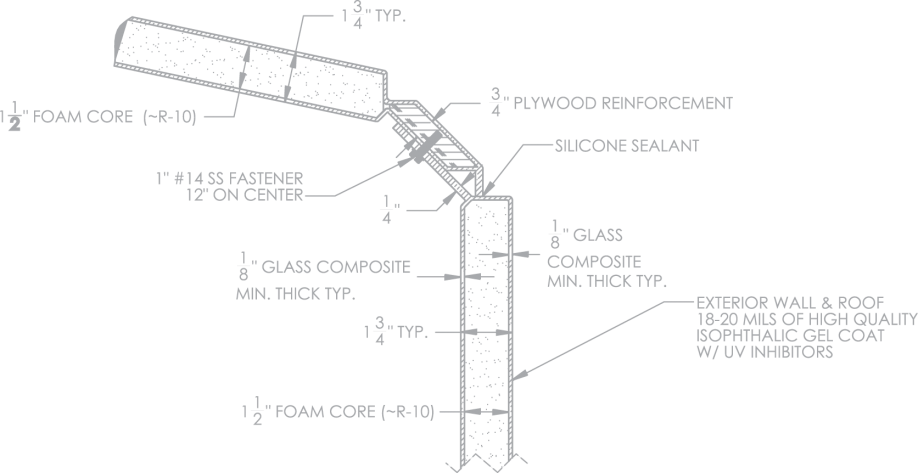Why Composites are Transforming Building Materials
From Waste to Marvel: Just How Recycled Composites Are Reinventing Numerous Applications
As industries worldwide are significantly focusing on sustainability and environmental obligation, the use of recycled compounds has actually become a transformative option throughout various industries. From boosting the performance of automobile elements to supplying sustainable choices in construction materials, the applications of recycled composites are promising and large. By repurposing waste materials into ingenious composite frameworks, producers are not just lowering their environmental footprint but also unlocking a realm of possibilities for producing long lasting, effective, and environmentally friendly products. The ramifications of this shift towards recycled composites are profound, declaring a new age of sustainable practices and technical advancements that are improving sectors in unexpected means (composites).
The Increase of Recycled Compounds
The enhancing fostering of recycled compounds in numerous sectors mirrors a growing recognition of their environmental and economic advantages. Recycled compounds, originated from products such as reclaimed carbon fiber or recycled plastics, supply a lasting alternative to typical materials without compromising on efficiency. Industries ranging from auto and construction to aerospace and customer products are increasingly transforming to recycled composites to fulfill their manufacturing demands.
One key driver behind the increase of recycled compounds is the press towards sustainability and eco-friendliness. Firms are under enhancing stress to reduce their carbon impact and minimize waste generation. Recycled compounds offer a remedy by using products that would certainly otherwise wind up in land fills, thus advertising a circular economic situation.
Additionally, the financial advantages of making use of recycled composites can not be neglected. These products are commonly more economical than their virgin equivalents, providing firms a way to decrease manufacturing costs without compromising top quality. As advancements in reusing modern technologies continue to enhance, the fostering of recycled compounds is anticipated to further boost throughout varied industries.
Advantages in Automotive Market

Sustainable Solutions in Building
Integrating lasting techniques in building and construction projects is crucial for minimizing environmental impact and promoting long-term viability in the built environment. With the building market being among the largest contributors to carbon discharges and waste generation internationally, the fostering of lasting options is vital in minimizing these adverse results. Recycled compounds are playing a substantial function in reinventing building practices by using an extra environmentally friendly alternative to typical structure products.
Recycled composites, stemmed from materials such as redeemed rubber, plastic, and wood, provide a sustainable alternative for numerous building applications. These materials not just assist in minimizing waste however also offer toughness, sturdiness, and flexibility comparable to standard construction products. By incorporating recycled compounds into structure designs, building and construction projects can add to resource conservation and energy performance while preserving high efficiency standards.
In addition, using recycled compounds in construction lines up with the expanding demand for environment-friendly over here buildings and lasting facilities. As ecological check these guys out regulations end up being more stringent and the concentrate on sustainability escalates, the building sector is progressively transforming to recycled compounds as a practical option for producing eco-conscious structures and frameworks.
Eco-Friendly Innovations in Packaging
Eco-friendly products such as mushroom product packaging, seaweed-based movies, and compostable plastics supply appealing remedies to the plastic air pollution crisis. These ingenious products not only break down naturally, minimizing environmental impact, however likewise provide equivalent capability and sturdiness to conventional packaging choices.
In addition, the assimilation of recycled materials right into product packaging production processes additionally boosts sustainability initiatives. By incorporating post-consumer recycled material, business can lower the need for virgin materials, save all-natural resources, and promote a circular economic situation in the product packaging industry.
Transforming Textiles With Recycled Composites
In the world of lasting materials, the emphasis now changes towards changing textiles with the innovative usage of recycled compounds. This development in textile production is driven by the pushing requirement for even more environment-friendly methods in the style and fabric markets. Recycled compounds provide an encouraging service by incorporating materials like plastics, carbon fiber, and glass fiber to develop durable and flexible fabrics.
One of the crucial benefits of utilizing recycled compounds in textiles is the capability to repurpose waste products that would otherwise wind up in landfills. By integrating recycled components into materials, makers can reduce their environmental effect and contribute to a more round economic situation - composites. Additionally, textiles made from recycled compounds often exhibit improved efficiency, toughness, and durability attributes, making them excellent for a vast array of applications
As consumer demand for sustainable items proceeds to increase, the fostering of recycled composites in textiles useful reference is poised to grow substantially. This change towards more eco-friendly textile production not only profits the planet but also opens up brand-new possibilities for innovation and creativity in the style and fabric sectors.
Verdict

From boosting the performance of auto elements to offering lasting alternatives in building and construction materials, the applications of recycled compounds are appealing and vast. Recycled compounds, derived from materials such as redeemed carbon fiber or recycled plastics, provide a lasting alternative to standard materials without jeopardizing on efficiency. Furthermore, the usage of recycled compounds promotes the round economic climate by diverting waste from garbage dumps and reducing the requirement for virgin raw products - composites.Recycled composites, obtained from products such as reclaimed timber, rubber, and plastic, provide a sustainable choice for numerous building and construction applications.In the world of sustainable materials, the emphasis currently shifts towards changing fabrics with the innovative use of recycled composites